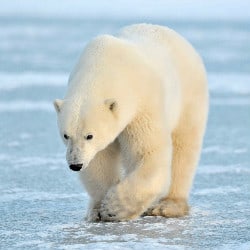WWF Report Claims We Are losing Wildlife At An Alarming Rate

A new report by WWF claims that as many as two thirds of the worlds wildlife could be extinct by the end of the decade if action is not taken immediately. Since 1970, 58 per cent of the numbers of fish, mammals, birds and reptiles have already disappeared says the latest bi-annual Living Planet Index commissioned by WWF. If that figure is accurate, it means that wildlife across the planet is disappearing at the rate of 2 per cent a year.
WWF conservation scientist Martin Taylor says the cause is definitely human impact and it is safe to say we are in the midst of the sixth mass extinction. The main reason is because humans are using so much of the planet’s resources that we are destroying animal habitat. The report reiterates much of what Mr Taylor says and blames rapid extinction on loss of habitat, over exploitation of resources, pollution and climate change.
A threat to our future
One of the species mentioned in the report are elephants whose population has declined by as much as 20 per cent in just ten years. Other species that have seen big declines include sharks and rays. Mr Taylor says the decline of species of animals and fish around the world do not just represent a threat to biodiversity, but to humans as well. He adds that governments need to take action to halt the decline in biodiversity.
In order to prevent a sixth mass extinction, Mr Taylor says that government need to act immediately to reduce emissions and stop habitat destruction. There is a lot of things people can do even if they are not wealthy. This includes using renewable energy, purchasing certified sustainable products and most importantly talking to your member of parliament and asking for stronger environmental laws.
Report findings criticised
Many conservationists agree with the overall findings, but argue the results of the report could be misleading. Stuart Pimm of Drake University says it is fairly silly to claim there has been a 58 per cent decline in wildlife populations. This is because it combines what is going on in the ocean with what is happening on land. It mixes the study of bird populations in Europe with mammal populations in Africa and the report has very few data points about what is happening in South America. Mr Taylor responds that WWF has been extremely transparent about the data’s variability.
“There’s always going to be criticisms, we know that there’s a lot of variability in the data and that’s all expressed quite openly in the report itself … we know that this not an easy task to try and aggregate numbers across an entire planet,” he said.



